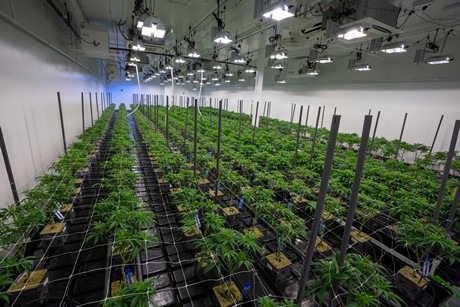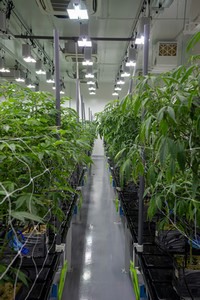The state of Nevada has one of the strictest testing requirements among the fragmented regulatory environments in the US. Cannabis products are carefully checked for the smallest trace of microbials, bacteria, mildew, mold, and such. Therefore, growing cannabis there can be quite challenging, but at the same time ensures that flowers are of a superior quality, if only for the exceptional care that growers are asked to put into every single plant they grow.
A craft approach
1933 Industries is a cannabis company that has operations in California and Colorado, but their main hub is in Nevada. There, the company has built a state-of-the-art indoor facility where cannabis is grown following a craft approach. “We aimed to grow craft style cannabis,” says Chris Rebentisch, 1933 Industries CEO. “In order to do that, you need to have the highest control over every aspect of cultivation; the only way to achieve that is by growing indoors. You can control everything to scale it up or down through automated systems that can mimic the outside conditions.”

Chris continues to explain that the whole point of growing indoors is to achieve the much-desired craft quality. “We built a very sterile facility, where we carry out processes in the cleanest and most environmentally-friendly way.”
A matter of genetics
According to Chris, one of the most important things to take into consideration is the quality of the cannabis genetics. “First and foremost, you need quality genetics,” he explains. “I have seen a number of growers going through particularly hard times because the genetics they chose were not the right ones to start with. 1933 Industries has partnered up with DNA Genetics, and we have our own quality genetic.”

However, a quality genetic is not enough, as that is only the first step in the process. “You need to control every aspect of the growing environment,” Chris points out. “I think that people do not invest enough in this. At the same time, other aspects are overlooked, such as the space necessary for drying or trimming. These are very delicate processes that influence the quality of the end-flower.”
Stimulating plants' genetic potential
“The whole purpose of the plant is to produce flowers; after that, it dies. To put it bluntly, we have to ensure that the plant ‘deceases’ in the best condition possible. For this reason, our entire facility is highly computerized, able to replicate the outdoor conditions within a safe and clean environment. At the same time, we have special drying chambers that bring the flower down to the right moisture content, in order to preserve the full genetic potential of the plant. On top of that, we hand-trim it, as a proper craft cannabis approach should be.”
A 'no flower' policy
Since cannabis products go through very strict tests, 1933 Industries has a ‘no flower policy’, if the cannabis plant gets out of the cloning phases with health issues. “Plants are monitored all the way, constantly,” he says. “If we find out that one of these has some issues, we just destroy it. In order to prevent any additional problems from arising, we use natural beneficials. Initially, we used ladybugs, but nowadays there is a wide array of beneficial insects that are specific to the condition by which a plant might be affected.”

A commodified future
Chris believes that the cannabis sector will mostly be brand-centric, and this is exactly the direction towards which 1933 Industries is going. “Our company counts many different brands, some also in collaboration with important partners, such as Tony Hawk,” he explains. “Consumers are getting educated, and it is only a matter of time before their shopping habits will change.”
For more information:
1933 Industries
105, 45655 Tamihi Way
Chilliwack, B.C.,
Canada V2R 2M3
604 674 4756
[email protected]
1933industries.com
